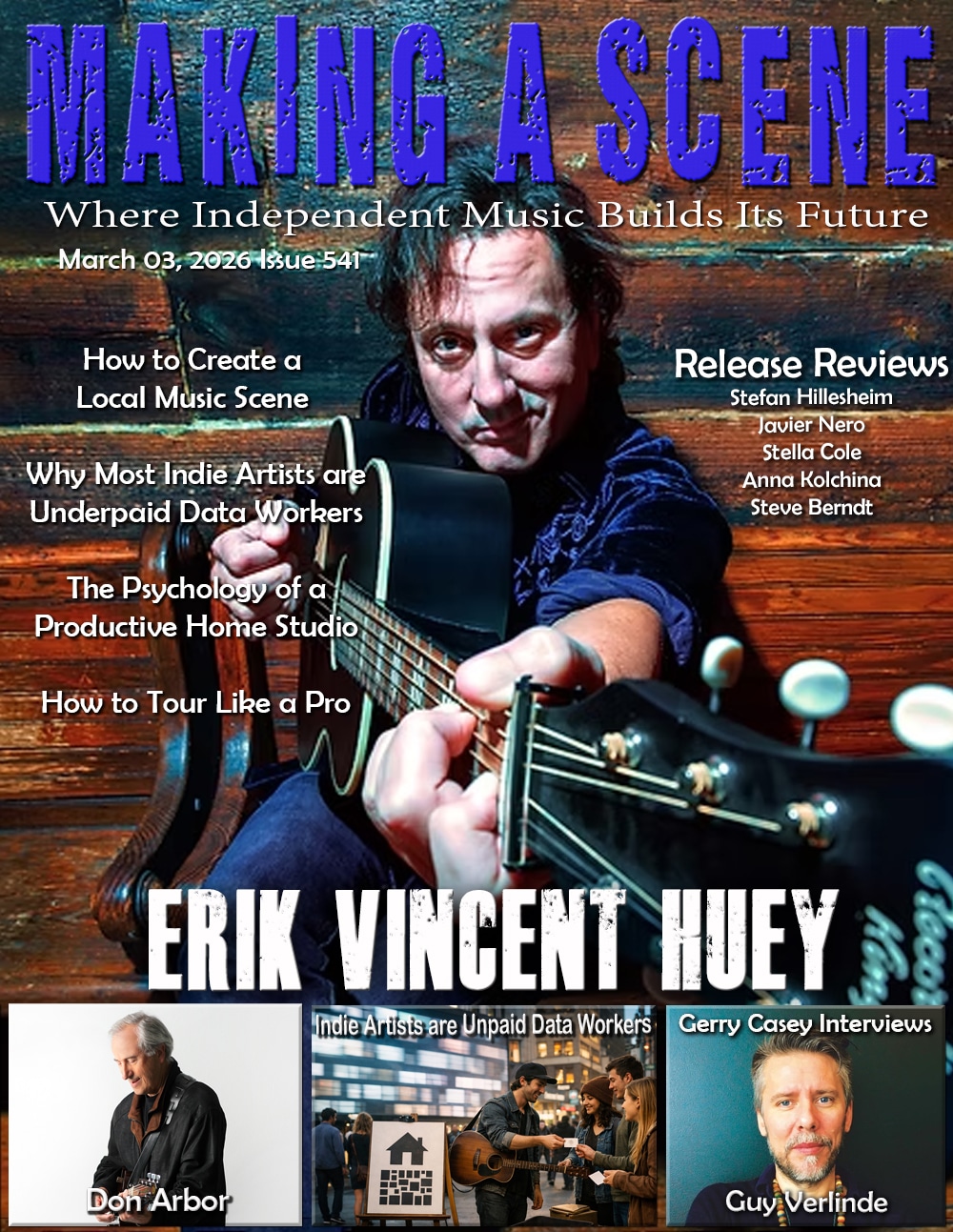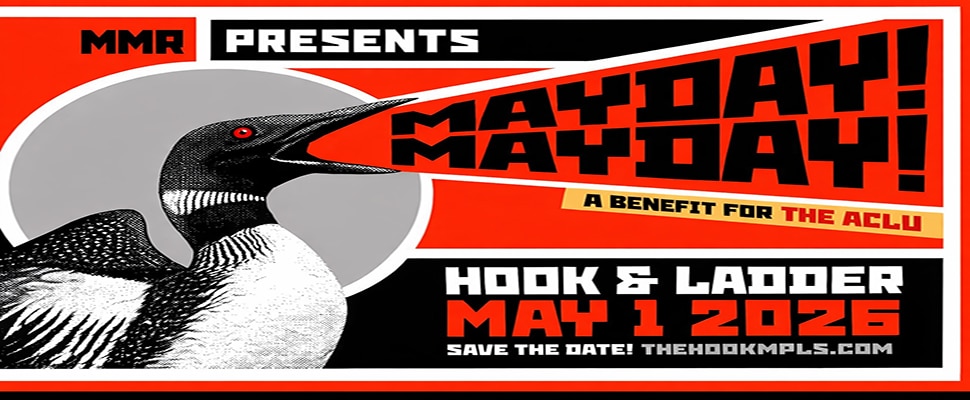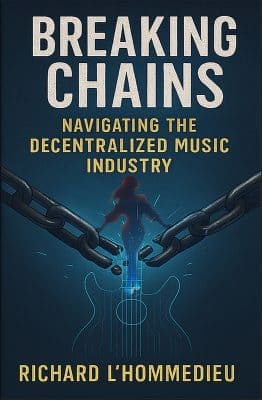Web3 Is Changing Music: How Big Industry Players Are Racing to Catch Up
Making a Scene Presents – Web3 Is Changing Music: How Big Industry Players Are Racing to Catch Up
The music industry is changing fast. For years, only a few big companies controlled how music was made, shared, and sold. Record labels, radio stations, and streaming services like Spotify and Apple Music held most of the power. If you were an artist, especially an independent one, you had to play by their rules just to be heard. Even then, you might only get paid a small amount, even if your music was popular.
But now, something new is happening. It’s called Web3. And it’s flipping the music world upside down.
Web3 is a new way of using the internet that’s built on technology like blockchain, smart contracts, and NFTs (non-fungible tokens). This technology lets artists connect directly with fans, get paid instantly, and own more of their music. Web3 gives more control back to the people who create music—and big music companies are starting to notice.
At first, Web3 seemed like a strange experiment. But now, it’s looking more and more like the future. That’s why some of the biggest names in the music industry are investing in it, testing new tools, and getting involved before it’s too late.
Let’s explore what Web3 is, how it helps musicians and fans, and what traditional music companies are doing to adapt to this new business model.
Understanding Web3 in Simple Terms
Think of Web3 as a new version of the internet. Instead of going through big middlemen—like Spotify, Apple, or YouTube—Web3 lets people share, buy, and sell things directly. That includes music, videos, artwork, and more. Everything is tracked on the blockchain, which is a digital system that records everything safely and publicly. No one can cheat or change the rules without everyone knowing.
With Web3, artists can create digital items, like music NFTs. These are special tokens that represent ownership of a song, album, ticket, or experience. Fans can buy them, trade them, or collect them. When an artist sells an NFT, they can get paid right away. And if that NFT is sold again later, the artist can earn a percentage every time it’s resold.
Smart contracts are another cool part of Web3. These are like digital agreements that run by themselves. Once a smart contract is set up, it can automatically split money between everyone involved in a song—like the singer, songwriter, and producer—without anyone needing to send invoices or wait months for payment.
That means no more guessing where the money went. Everything is clear, automatic, and fair.
Why Artists Love Web3
Right now, most artists don’t make much money from streaming. A single play on a streaming platform like Spotify only pays about half a cent. That means you need millions of plays just to make a few thousand dollars.
With Web3, artists don’t need millions of plays. They only need a few hundred dedicated fans who are willing to buy music directly. For example, if 100 fans each pay $50 for a special music NFT, that’s $5,000. That’s more than what most indie artists make from streaming in a whole year.
Web3 also helps artists build stronger relationships with fans. When someone buys your NFT, they might get access to exclusive songs, backstage content, or private fan groups. Fans feel more connected, and artists get real support from their community.
Some Web3 platforms even let fans buy a share of a song’s royalties. That means fans actually earn money when the song is played. It turns listeners into investors, which is a whole new way of thinking about music.
Web3 also allows artists to sell digital merchandise, like animated posters, AR clothing, or even VIP passes to virtual concerts. This isn’t just about music anymore—it’s about creating full experiences that fans can be part of.
The Big Guys Are Paying Attention
At first, Web3 felt like something only indie artists and crypto fans cared about. But now, major music companies are starting to get involved. They see that this new technology could change everything, and they don’t want to be left behind.
Take Napster, for example. This company used to be known for file sharing back in the early 2000s. Now, it’s being rebuilt as a Web3 music platform. Napster was bought by blockchain investors who want to make it a space where artists and fans connect directly using tokens, NFTs, and decentralized tools.
Warner Music Group is also jumping in. They’ve partnered with Polygon Studios, an organization that helps brands build Web3 apps. Warner is creating virtual merchandise, digital avatars, and even exploring metaverse concerts. They want to give fans new ways to experience music—whether that’s buying a digital shirt or attending a virtual show.
Universal Music Group is doing something similar. They created a virtual band called Kingship, made up of cartoon monkeys from the Bored Ape Yacht Club, which are some of the most famous NFTs in the world. Kingship is a Web3 experiment that lets fans collect NFTs, unlock special content, and be part of a music world that exists entirely online.
Sony Music has filed trademarks for music NFTs, blockchain rights management, and virtual events. They’re quietly preparing for a world where music isn’t just streamed—it’s collected, shared, and owned in brand-new ways.
Spotify has also tested Web3 tools. In some trials, they allowed users to unlock playlists using NFTs. While it’s still early, this shows that even the biggest streaming service in the world is looking at ways to use blockchain and digital ownership.
TIDAL, which is owned by Block Inc., the company run by Jack Dorsey, has talked about using blockchain to pay artists more fairly. TIDAL wants to create a system where artists can control their own data and income, without depending on labels or distributors.
Audius, while not a traditional company, is leading the way in Web3 streaming. It’s fully decentralized, meaning no company owns it. Artists upload music directly, and fans use tokens to support them. It’s one of the clearest examples of what a Web3 music platform can look like—and it’s growing fast.
Other platforms like Royal.io, Unchained Music, and Serenade are also helping artists sell NFT songs, split royalties with fans, and protect their music rights using blockchain.
Why They’re Doing This
Big music companies aren’t changing just because they want to. They’re doing it because they have to. The old model—where labels made all the decisions and artists waited to get paid—isn’t working anymore. Fans want more connection, and artists want more control.
Web3 offers a new business model where everyone wins. Artists can earn more money directly from fans. Fans can be more involved and feel like part of the artist’s journey. And companies can create new kinds of products and experiences to sell.
For labels, this also opens new income streams. They can sell digital collectibles, host virtual concerts, and reach fans in new ways. The internet is becoming more immersive—and music is becoming more interactive.
Web3 also helps fix problems that have been around for years, like missing royalty payments or disputes over who owns a song. With smart contracts and blockchain, everything is recorded clearly and automatically. There’s no guessing or waiting—it just works.
It’s Already Happening
This shift to Web3 isn’t just a dream. It’s already happening.
Artists like Daniel Allan have raised over $140,000 by selling NFTs for their albums. He used that money to build his career without needing a label. Haleek Maul did something similar and earned enough to build a music studio in Barbados.
Nas, the famous rapper, used Royal.io to sell shares of his songs to fans. Those fans now earn a piece of his streaming income. It’s a powerful example of how Web3 can turn fans into business partners.
And let’s not forget about virtual fashion. Warner Music is working with DressX to sell “verch,” or virtual merch. Fans can wear these digital clothes in games, social media, and metaverse spaces. It’s a whole new kind of self-expression—and a brand-new revenue stream for labels.
Some labels have even signed digital characters as artists. Def Jam, part of Universal, signed a group called The Whales, made entirely of NFT avatars. These aren’t real people—but they have songs, fans, and a future in the digital world.
The Road Isn’t Always Smooth
Of course, Web3 isn’t perfect. There are challenges. Some people think NFTs are just a trend. Others don’t like the confusing tech, expensive gas fees, or environmental impact of some blockchains. And while some fans are excited about Web3, others are still unsure what it even means.
There are also legal questions. Who owns what? How are royalties tracked? What happens if an NFT is stolen or lost? These issues still need to be worked out.
Not every Web3 platform is living up to its promises. Some NFT marketplaces have stopped giving artists a cut of the money when their music NFTs are resold. That breaks one of the key ideas behind Web3—that artists should keep earning as their work gains value. The good news is that new tools and platforms are being built to fix this and make sure creators get paid fairly.
But here’s the truth: it’s up to independent artists to learn how this technology works and start using it in their own careers. The more indie musicians understand and adopt Web3 tools, the more power they have to shape the future of the music industry. If we leave it all in the hands of the big companies, there’s a real risk they’ll twist this technology to benefit themselves, just like they did with streaming. Web3 only stays fair if we, the artists, take control of it.
Even with these challenges, more and more artists and companies are giving Web3 a chance. They know that change is coming, and they want to be ready.
The Future Is Taking Shape
Imagine this. You’re an artist, and instead of begging a label for support, you sell your album as NFTs to your top 200 fans. You keep most of the money. Those fans get early access, merch, and even royalties. You drop a new track, and it’s automatically split between you, your producer, and your co-writer using a smart contract.
Your fans wear your merch in Roblox, Fortnite, or Instagram AR filters. You hold a virtual concert in a metaverse venue owned by Warner. And your entire career is built around your community—not just algorithms.
That’s the future Web3 is building. And the big companies see it. That’s why they’re moving fast to adapt, partner, experiment, and evolve.
Final Thoughts
The traditional music industry has been slow to change in the past. But this time, they’re waking up. Web3 isn’t just a buzzword—it’s a tool that can help fix what’s broken. It’s a new way for artists to make a living, for fans to feel connected, and for companies to grow in a fairer, more creative world.
Big names like Warner, Universal, Sony, Napster, Spotify, and TIDAL are jumping in. And as more artists and fans get involved, the music world will never be the same.
If there’s one message to take away, it’s this: indie artists need to step up and learn how Web3 works—because if we don’t, the traditional music industry will. This technology was built to give power back to creators, not corporations. But if we ignore it or wait too long, the same labels and platforms that broke the old system will find ways to control the new one. By understanding and adopting Web3 tools now—like NFTs, smart contracts, and decentralized platforms—we can shape a future where artists truly own their music, connect directly with fans, and build careers on their own terms. This is our moment to lead, not follow.
The writing is on the wall—and the old gatekeepers are reading it.
If you’re serious about understanding Web3 and how it can shape your music career, you need to check out Breaking Chains – Navigating the Decentralized Music Industry. This isn’t just another book—it’s the only resource available that explains Web3 technology in a way that’s clear, practical, and actually makes sense for indie artists. It breaks down complex ideas like blockchain, NFTs, DAOs, and smart contracts without the tech jargon, making it easy to understand no matter your experience level. Even more importantly, it’s the only book that connects all the pieces into one complete ecosystem, giving you a real roadmap for how Web3 can transform every part of the music business—from fan engagement to royalty payments and beyond. There’s nothing else like it on the market.
Buy Us a Cup of Coffee!
Join the movement in supporting Making a Scene, the premier independent resource for both emerging musicians and the dedicated fans who champion them.
We showcase this vibrant community that celebrates the raw talent and creative spirit driving the music industry forward. From insightful articles and in-depth interviews to exclusive content and insider tips, Making a Scene empowers artists to thrive and fans to discover their next favorite sound.
Together, let’s amplify the voices of independent musicians and forge unforgettable connections through the power of music
Make a one-time donation
Make a monthly donation
Make a yearly donation
Buy us a cup of Coffee!
Or enter a custom amount
Your contribution is appreciated.
Your contribution is appreciated.
Your contribution is appreciated.
DonateDonate monthlyDonate yearlyYou can donate directly through Paypal!
Subscribe to Our Newsletter
Order the New Book From Making a Scene
Breaking Chains – Navigating the Decentralized Music Industry
Breaking Chains is a groundbreaking guide for independent musicians ready to take control of their careers in the rapidly evolving world of decentralized music. From blockchain-powered royalties to NFTs, DAOs, and smart contracts, this book breaks down complex Web3 concepts into practical strategies that help artists earn more, connect directly with fans, and retain creative freedom. With real-world examples, platform recommendations, and step-by-step guidance, it empowers musicians to bypass traditional gatekeepers and build sustainable careers on their own terms.
More than just a tech manual, Breaking Chains explores the bigger picture—how decentralization can rebuild the music industry’s middle class, strengthen local economies, and transform fans into stakeholders in an artist’s journey. Whether you’re an emerging musician, a veteran indie artist, or a curious fan of the next music revolution, this book is your roadmap to the future of fair, transparent, and community-driven music.
Get your Limited Edition Signed and Numbered (Only 50 copies Available) Free Shipping Included
Discover more from Making A Scene!
Subscribe to get the latest posts sent to your email.









